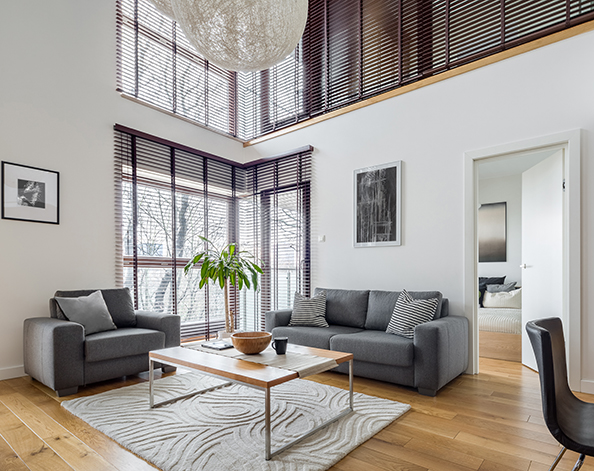Despite five years of tax and regulatory changes for landlords, buy-to-let property could still be an attractive option for investors, according to industry experts.
Following publication of its latest research report, Hampton International’s Head of Residential Research Aneisha Beveridge joined Investec Private Bankers Quinton Naidoo and James Thomson to discuss the state of the rental market. The message? Those who are mindful of geographic trends and tenant demand could benefit from financial returns in a post-pandemic world.
What is the effect of stamp duty on buy-to-let investment?
In 2016 the Government introduced a 3% Stamp Duty surcharge for second home buyers at a time of weak house price growth. Many feared this would affect long-term profitability and the number of buy-to-let investors entering the market began to decline.
Further changes to mortgage interest tax relief in 2020 affected yields as landlords offset less of their costs under the new rules. And then there was the introduction of an additional 2% levy for international buyers too.
However, experts acknowledge that the Stamp Duty holiday introduced in July 2020 – and its subsequent extension – has piqued interest once again. Until 30 June 2021, the base rate of stamp duty payable on the first £500,000 of a residential property purchase has been temporarily removed, meaning a maximum saving of £15,000.
“As time has gone on, we've seen more people be optimistic about the buy-to-let sector,” Aneisha says. “The Stamp Duty holiday has made people bring forward their decisions. The thought of saving an extra £15,000 could be a new kitchen for a property. And in terms of the yield of your investment, it's a lot of money,” she adds.
Quinton says the ability to work quickly to finalise mortgage agreements is valued by clients and brokers at this time. “The Stamp Duty holiday has focused minds and because we’re able to take a holistic view of clients’ financial situations, we can help them seize opportunities,” he adds.

As time has gone on, we've seen more people be optimistic about the buy-to-let sector. The Stamp Duty holiday has made people bring forward their decisions. The thought of saving an extra £15,000 could be a new kitchen for a property. And in terms of the yield of your investment, it's a lot of money, she adds.
How does property compare to other asset classes?
While each opportunity is different – and independent advice should be sought – property has an enduring appeal for many investors.
“Property has always been seen as a good store of value and an asset class that has been favoured. It’s been that way because investors like something tangible,” says Quinton.
The current economic climate is motivating property enquiries, adds Aneisha. “With low-interest rates on cash savings and volatile stock market performance, we've seen an increase in the number of purchases by investors in the past four months.”
What could a projected return look like?
The performance of an investment property varies by metric.
“It all comes back to why you are investing,” Aneisha says. “Are you wanting rental income, which you might use to bolster part of your salary? Do you own multiple properties and seek diversification? Or are you more reliant on house-price growth to form a longer-term investment strategy?
“For example, London house prices have risen significantly over the last 10 years, so a lot of return comes from capital growth here, and less-so from rental income as yields aren't particularly high,” she adds.
Hamptons International estimates that in the 2020/21 tax year, the net yield on a property for a higher-rate taxpayer was 2% on average. In London, where costs are higher, the average net yield was 1.2%. However, when capital growth and rental income are added together over an assumed nine-year period of ownership, some London landlords have seen a 4.5% annual return with 80% of profits coming from growth in the value of the property over time.
It’s worth noting that changes to Capital Gains Tax could impact the return on any future sale of a property and the past performance of an investment should not be relied upon.
James notes that many Investec clients have an emotional as well as a practical motivation for property investment. “We're seeing clients investing with a long-term strategy for their children’s future. They're looking at purchasing a buy-to-let in London – where they’re getting some capital growth and some yield on those assets – and then ultimately having the property as somewhere their kids can move into after school or university.”

We're seeing clients investing with a long-term strategy for their children’s future. They're looking at purchasing a buy-to-let in London – where they’re getting some capital growth and some yield on those assets – and then ultimately having the property as somewhere their kids can move into after school or university.
Will the lifting of lockdown restrictions impact the market?
The easing of coronavirus restrictions could see a resurgence of demand from tenants.
“We saw a lot of renters leaving homes in inner-London last year, as the opportunity to work more flexibly drove a move out of cities and a desire to live somewhere cheaper and save money,” Aneisha says. “I think we may see some of those people looking to move back to cities as lockdown comes to an end.”
James says that there could also be more demand for rental properties if less people decide to buy their own home.
“There’s a lot of buoyancy based on the stamp duty reduction, which will end this year, so it's worth thinking about what impact this will have on the market when it is gone,” he adds. “However, when support measures which have preserved income – like the furlough scheme – are rolled back, we may see this affect where people want to live and work too.”
Investing beyond the capital
There are investment opportunities beyond the capital, particularly for first-time landlords.
“Generally, the whole of the North East is a higher-yielding region than London and the South East, and there are very low entry costs for this area,” Aneisha says.
Buy-to-let properties within the Home Counties have been snapped up too. “With people working from home more often and wanting to rent homes with gardens, we’ve seen clients look to buy in areas such as Surrey and Buckinghamshire that are still a commutable distance from London,” says Quinton.
That said, it can be harder to choose a property in a less familiar area.
“Because the London property market has grown so much over the last few years, it’s seen as a safe place to invest. Some clients – particularly those based overseas – may not have heard of cities further afield.
“Investec can introduce clients to buying agents which some have found invaluable,” Quinton says. “As much as an estate agent can give you the physical tour, having someone act as your buying agent completely changes the narrative, and immediately gives the benefit to the client.”
The location of your buy-to-let may dictate desirable property types.
“People can often make the mistake of not thinking about their target tenant. For example, if investing in London you might want think about a flat with a balcony or nearby amenities given the shift to working from home,” Aneisha says.
“Whereas if you're investing with a view to shared properties, such as in university cities, or nearby hospitals, this is where you need optimal bedroom space.”
The structure of buy-to-let
Once you’ve found a suitable property – or properties – it’s useful to consider how the purchase will be structured and take independent tax advice.
Over the last five to six years, there's been a shift from owning buy-to-lets as an individual, to owning it under a limited company. “If this is a business opportunity, there can be benefits such as paying UK corporation tax on any profit, rather than income tax,” Aneisha says.
Should you consider a buy-to-let investment?
While regulations and taxation have changed for buy-to-let property, it can still have the potential to deliver profitable returns.
In challenging times, James says working with the right lender is important.
“We are able to make our affordability assessment on a client's entire financial position, and not just on rental income,” he says. “If you're thinking about a long-term investment rather than selling assets, taking a holistic view is vital and can help make it worthwhile.”
For more information on how we could support your buy-to-let ambitions, please get in touch today.
Our private bankers are highly experienced with a history in complex lending and relationship management.
Browse articles in

